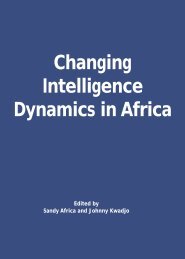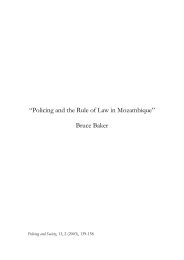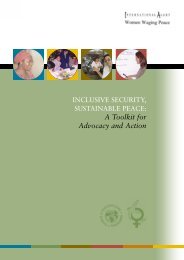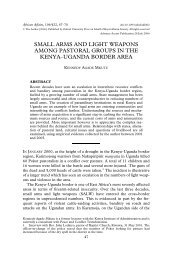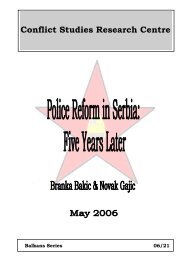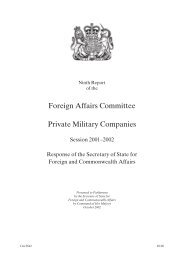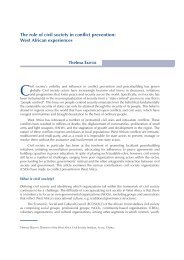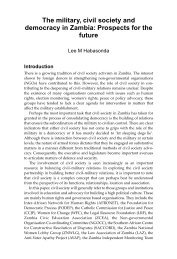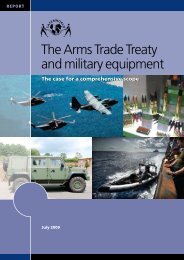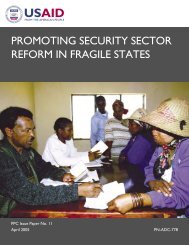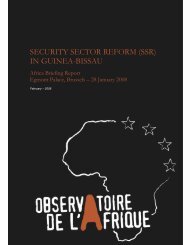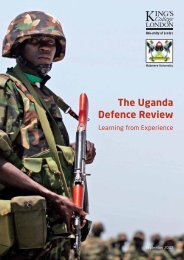AFGHANISTAN'S ELECTION CHALLENGES
AFGHANISTAN'S ELECTION CHALLENGES
AFGHANISTAN'S ELECTION CHALLENGES
Create successful ePaper yourself
Turn your PDF publications into a flip-book with our unique Google optimized e-Paper software.
Afghanistan’s Election Challenges<br />
Crisis Group Asia Report N°171, 24 June 2009 Page 14<br />
little immediate purpose other than appearing partisan<br />
in an Afghan game of brinkmanship. 100 Similarly,<br />
anonymous media interviews by Western diplomats<br />
stating that Karzai is the inevitable victor 101 are extremely<br />
unhelpful and reinforce Afghan perceptions<br />
of interference by foreign hands. U.S. President Barack<br />
Obama has declared that the U.S. is not supporting any<br />
candidate 102 with retired diplomat Timothy Carney in<br />
charge of coordinating U.S. electoral efforts.<br />
B. 12VOTER REGISTRY AND POPULATION DATA<br />
1. 23Past exercises<br />
In the 2001 Bonn Agreement, the UN was requested<br />
to assist with conducting a census and establishing a<br />
voter registry, both of which it failed to deliver. 103<br />
These processes were again subject to tight benchmarks<br />
in the 2006 Afghanistan Compact 104 and were<br />
similarly missed. A census provides crucial information<br />
needed for drawing up constituencies and ensuring<br />
equitable representation. A full census has yet to<br />
be held in Afghanistan, with the last partial exercise<br />
in 1979 disrupted by conflict. In June 2008, the cabinet<br />
indefinitely delayed the planned 2008 census because<br />
of security concerns. 105 However, political pressures<br />
presumably also lay behind the decision. Given disputes<br />
among ethnic groups and regions over the relative<br />
size of their communities, ambiguity suited many.<br />
A robust voter registry is a vital tool to prevent fraud<br />
and for poll planning. The original 2004 voter registration<br />
exercise saw 10.6 million Afghans registered –<br />
100 “Statement on President Karzai’s Decree”, Robert Wood,<br />
Acting Department of State Spokesman, 28 February 2009.<br />
101 “If I was a betting man I would reckon he (Karzai) was<br />
going to win on the first round,” one western official told<br />
Reuters. Sayed Salahuddin and Peter Graff, “Forty vie to<br />
unseat Afghanistan’s Karzai, Reuters, 13 June 2009.<br />
102 “Statement by President Barack Obama on the start of the<br />
Afghan election campaign”, 16 June 2009, www.whitehouse.gov<br />
103 Bonn Agreement, Annex III “Request to the United Nations<br />
by the Participants at the UN Talks on Afghanistan”,<br />
December 2001. “The participants in the UN talks on Afghanistan<br />
hereby … request the United Nations to conduct<br />
as soon as possible (i) a registration of voters in advance of<br />
the general elections that will be held upon the adoption of<br />
the new constitution by the constitutional Loya Jirga and<br />
(ii) a census of the population of Afghanistan”.<br />
104 “A permanent civil and voter registry with a single national<br />
identity document will be established by end-2009”; “The<br />
census enumeration will be completed by end-2008 and the<br />
complete results published”. The Afghanistan Compact,<br />
January 2006.<br />
105 Pia Heikkila, “Afghan census cancelled due to security<br />
fears”, The Guardian, 11 June 2008.<br />
with an additional 740,000 out-of-country registrants<br />
(with different cards, not usable in Afghanistan) in<br />
Pakistan. 106 Out-of-country voting was also conducted<br />
in Iran using identity cards, but without prior<br />
registration. In the 2005 update, an additional 1.7 million<br />
voter cards were issued. 107 Neither exercise<br />
linked voters to specific districts or polling centres or<br />
provided voter lists. This made district elections – had<br />
the delineation of boundaries been agreed, another<br />
essential prerequisite – almost impossible. Preparations<br />
for polls were also greatly complicated because<br />
people could vote anywhere, making turnouts unpredictable.<br />
In the 2005 elections, 40 million ballot papers<br />
were printed for around 12 million registered<br />
voters (each voting in two elections), increasing the<br />
potential for fraud.<br />
In September 2005, the European Union election observation<br />
mission report noted: “Afghanistan still has no<br />
accurate Final Voter List despite two elections. The<br />
2005 update is likely to have led to an increase in<br />
multiple registrations”. 108 Two years later, in 2007, an<br />
IEC report noted: “The necessity for a detailed and<br />
accurate Voter Registry, allocating voters to specific<br />
polling stations, cannot be underestimated”. 109<br />
Following the 2005 parliamentary poll, it was broadly<br />
agreed that the voter registry would be tied in with a<br />
civil registry, providing the population with national<br />
identification while gathering basic data; a 2009 deadline<br />
was set in the Afghanistan Compact. 110 A pilot project<br />
commenced in April 2007 only for the cabinet to<br />
decide a few months later that the two processes should<br />
be separated. 111 In 2008, amid ongoing rivalry between<br />
Afghan ministries over control of the project and the<br />
data, with elections now looming, attempts at wider<br />
106 UNDP Voter Registry Project and 2004 Afghan Elections<br />
Project Annual Report, November 2003-December 2004,<br />
pp. 23-24. 590,000 of the registrants in Pakistan voted.<br />
107 “Final Report: National Assembly and Provincial Council<br />
Elections 2005”, JEMB, December 2005, p. 5.<br />
108 “Statement of Preliminary Findings and Conclusions”,<br />
European Union Election Observation Mission, 19 September<br />
2005, p. 5.<br />
109 “Independent Election Commission Strategy for Afghanistan<br />
National Development Strategy (Draft)”, Islamic Republic<br />
of Afghanistan, March 2007, p. 5.<br />
110 “A permanent civil and voter registry with a single national<br />
identity document will be established by end-2009”. Afghanistan<br />
Compact, January 2006.<br />
111 In June 2007 the Cabinet passed a decision separating voter<br />
registration from civil registration. “Census and Elections:<br />
Update for JCMB VII”, Islamic Republic of Afghanistan,<br />
29 January 2008, p. 2.



